Writing linter rules:
why, how and when
Jeroen Engels
@jfmengels

Jeroen Engels
@jfmengels everywhere
jfmengels.net

Elm Radio podcast

elm-review

Aim: provide instinct
Not a tutorial

Elm
Disclaimer
Examples are going to be in JavaScript / TypeScript / Elm
Linter

Guarantees
function shout(sentence) {
return sentence.toUpperCase();
}
shout(100);
// Uncaught TypeError: sentence.toUpperCase is not a functionfunction shout(sentence) {
return sentence.toUpperCase();
}
shout(100);function shout(sentence: string) {
return sentence.toUpperCase();
}
shout(100);
// Argument of type 'number' is not assignable to parameter of type 'string'.Type error?
Static type checker!
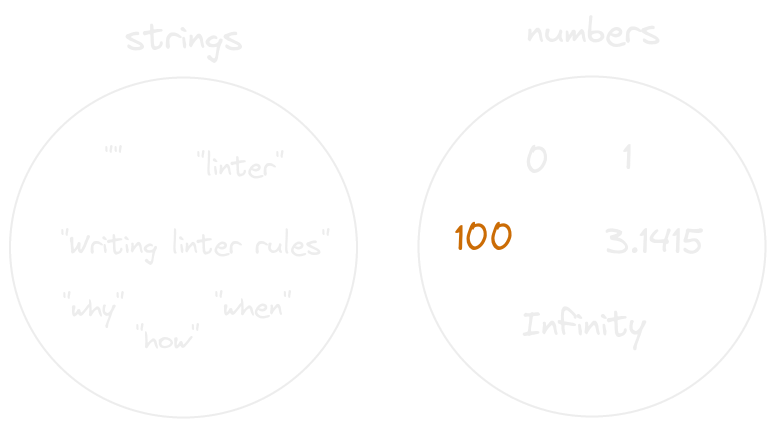
Type checking:
Comparing values
and sets of values
function printAverage(scores: number[]) {
console.log("Your average score:", average(scores));
}
function average(array: number[]): number {
return sum(array) / array.length;
}
function sum(array: number[]): number {
// Correct implementation of a sum
}
printAverage([]);function printAverage(scores: number[]) {
console.log("Your average score:", average(scores));
}
function average(array: number[]): number {
return sum(array) / array.length;
}
function sum(array: number[]): number {
// Correct implementation of a sum
}
printAverage([]);
// "Your average score: NaN"function average(array: number[]): number {
return sum(array) / array.length;
}
printAverage([]);
// "Your average score: NaN"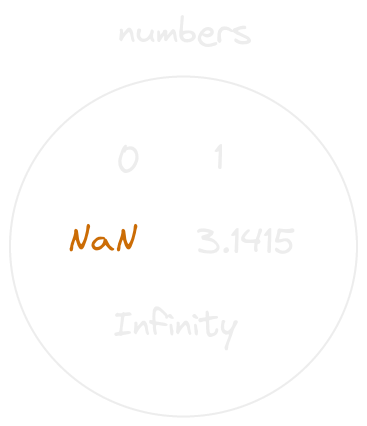
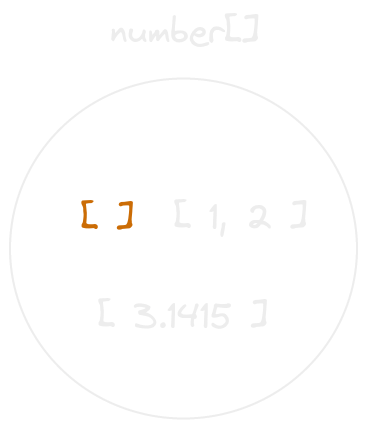
Can we use types?
test('average() returns 0 when the array is empty', () => {
assert.equals(average([]), 0);
});
function average(array: number[]): number {
if (array.length === 0) {
return 0;
}
return sum(array) / array.length;
}Tests: checking
specific values in specific scenarios
| array | average(array) |
|---|---|
| [ ] | 0 |
| [ 1, 2 ] | 3 |
| ... | ... |
import Colors from './colors';
const buttons =
[
button({ color: Colors.primary }, "First button"),
button({ color: "#FF1122" }, "Second button"),
];const buttons =
[
button({ color: Colors.primary }, "First button"),
button({ color: "#FF1122" }, "Second button"),
];
test("The second button's color is primary", () => {
assert.equals(buttons[1].getColor(), Colors.primary);
});| <no-input> | color buttons[0] | color buttons[1] | ... |
|---|---|---|---|
| Colors.primary | Colors.primary | ... |
Triangle
button({ color: "#FF1122" }, "Second button"),
^^^^^^^^using grep
grep -e 'color: "' src/**/*.tsBuilding a linter
#!/bin/bash
MATCH=$(grep -e 'color: "' src/**/*.ts --with-filename --line-number --color=always)
if [ -n "$MATCH" ]; then
echo "Found linting problems:"
echo ""
echo $MATCH
exit 1
fiBuilding a linter
using grep

// 2 spaces
button({ color: "#FF1122" }, "..."),
// No spaces
button({ color:"#FF1122" }, "..."),
// Space before the colon
button({ color : "#FF1122" }, "..."),
// Uses single-quotes
button({ color: '#FF1122' }, '...'),False negatives
grep -e 'color: "' src/**/*.ts/*
Don't ever write
button({ color: "#FF1122" }, "..."),
Instead use
button({ color: Colors.primary }, "..."),
*/False positives
Abstract Syntax Trees
(a + b) / 2Integer 2Binary expression
using "+"Reference to "a"Binary expression
using "/"Reference to "b"ParenthesizedPattern matching on the AST
a / 0Integer 0Reference to "a"Binary expression
using "/"Rule: No division by 0
If I see a binary expression using "/" where on the right side there's an integer 0 , then report a problem.
Pattern matching on the AST
{ color: "#FF1122" }String literalField "color"Property

What's the problem?
Communication

And what's the problem with hardcoded colors anyway?


What should I do instead?
People need to understand
-
What they did wrong
-
Why it is a problem
-
How to move forward
Not understanding reports
leads to workarounds
🤬
const buttons =
[
button({ color: Colors.primary }, "First button"),
// linter-disable
button({ color: "#FF1122" }, "Second button"),
];Context
Problem
Suggestion
Example
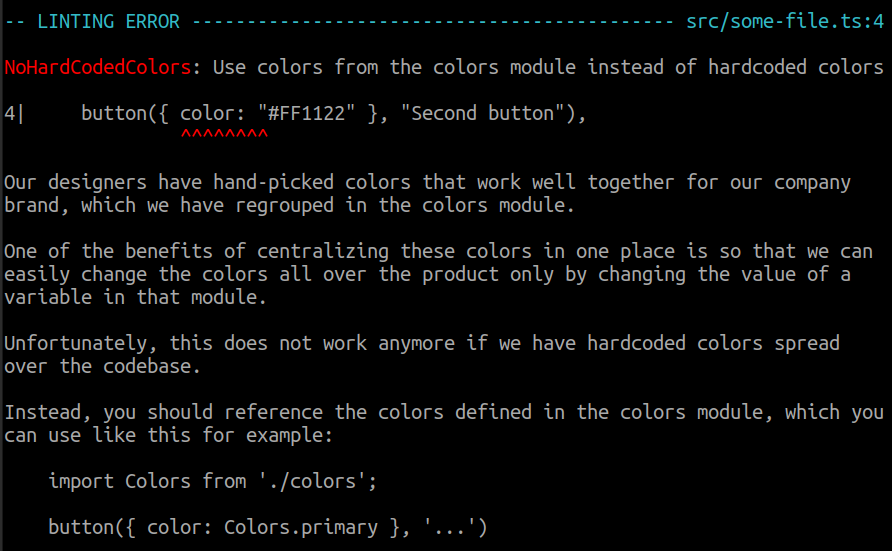
Applications
Enforce using custom solutions instead of built-in ones
TODO Example HTTP library that sets all the right headers
A lot of the code reviews comment that people say that are not too complex but that people just have to know, can probably be automated using linter rules
Imposing limits
TODO Making sure that one module does not import another one. That one does not import internals of another module.
TODO console.log(context) example?
Deprecate code
TODO Forbid the usage of a v1 of something and promote a v2 instead
Automate documentation
Gain new guarantees
TODO Safe unsafe operations
Generate code
TODO Html decoder
Enforcing code style
Consistency is good
Code formatters
module MyModule exposing (Model, Msg, update, view)
import Html exposing (Html, button, div, text)
import Html.Events exposing (onClick)
type alias Model =
{ count : Int }
type Msg
= Increment
| Decrement
update : Msg -> Model -> Model
update msg model =
case msg of
Increment ->
{ model | count = model.count + 1 }
Decrement ->
{ model | count = model.count - 1 }
view : Model -> Html Msg
view model =
div []
[ button [ onClick Increment ] [ text "+1" ]
, div [] [ text <| String.fromInt model.count ]
, button [ onClick Decrement ] [ text "-1" ]
]Not all rules are good
Concert with colleagues
Should you publish your rule?



🤬
Linter

//nolint:rule
# pylint: disable=rule
# rubocop:disable rule
// NOLINT
// phpcs:disable rule
@SuppressWarnings("rule")
@Suppress("rule")
// eslint-disable rule
You don't trust your linter
elm-review


False positives
Communication
Automatic fixes
Configuration
Ignoring reports
False positives
when the tool reports issues that it shouldn't have
when the tool reports issues that it shouldn't have
🤬
🫶
// linter-disable
// linter-disable
// linter-disable
How should I fix this issue?
Should I ignore this report?
Causes of false positives
Bugs


Missing information
Presumptions
False positives/negatives
(when the tool doesn't report an issue that it should have reported)
Providing information
-
Contents of all files in the project
-
Type information
-
Dependencies
-
Files from different languages
How easy is it to analyze the language?
Compiled languages
Statically typed languages
Explicit patterns
Dynamic constructs

Effective false positives
true positives that are considered to be false positives
Automatic fixes
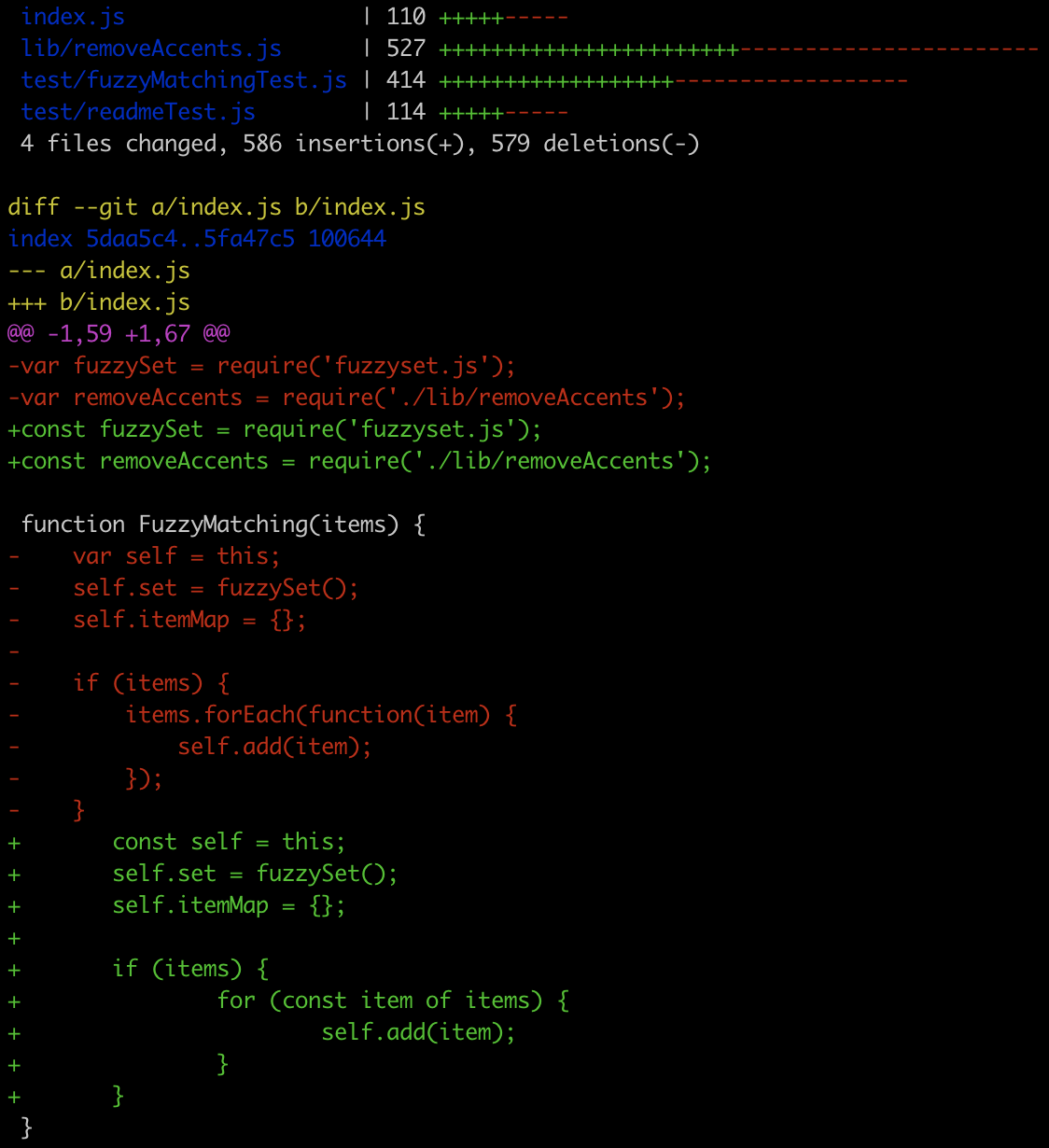
Prompt for fixes
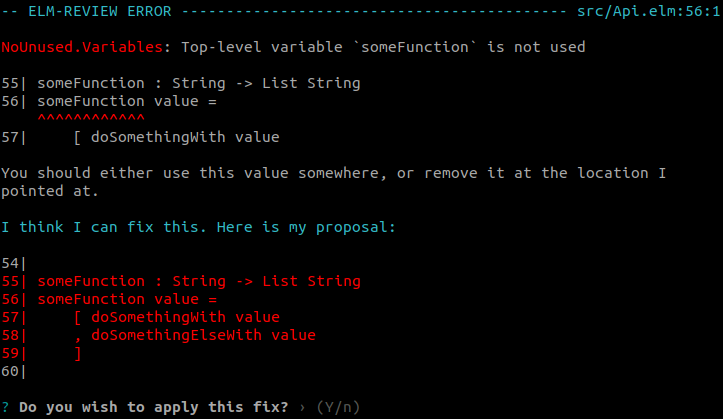
Configuring linters
Accidental configuration
Essential configuration
Accidental configuration
What language features are available/enabled?
What tools does this project work with? Build tools, macros...
False positives
because of the configuration
Tell the tool how to work with your project because it can't figure some information on its own
Accidental configuration
All necessary information
in standard files
// elm.json
{
"type": "application",
"source-directories": [
"src"
],
"elm-version": "0.19.1",
"dependencies": {
"...": "..."
}
}
Essential configuration
Tell the tool what you want from it
Which rules do you want to enable?
Configuring elm-review
config : List Rule
config =
[ NoBadThing.rule
, NoOtherBadThing.rule { some = "options" }
-- ...and more rules
]Enable rules
you agree with
false positive ≈ error you disagree with
Advice on adding a rule
Be ready to disable the rule if it feels painful
Understand the problem well
Get your team's approval
Understand not all rules are good
Ignoring reports
//nolint:rule
# pylint: disable=rule
# rubocop:disable rule
// NOLINT
// phpcs:disable rule
@SuppressWarnings("rule")
@Suppress("rule")
// eslint-disable rule
Disable comments
Warnings
For rules you don't want to enforce...?
Errors
For rules you want to enforce
Line 10: Don't do this thing
Line 11: Don't do this thing
Line 12: Don't do this thing
Line 13: Don't do this thing
Line 14: Don't do this thing
Line 15: Don't do this thing
Line 16: Don't do this thing
Line 17: Don't do this thing
Line 18: Don't do this thing
Line 19: Don't do this thing
Line 20: Don't do this thing
Line 21: Don't do this thing
Line 22: Don't do this thing
Line 23: Don't do this thing
Line 24: Don't do this thing
Line 25: Don't do this thing
Line 26: Don't do this thing
Line 27: Don't do this thing
Line 28: Don't do this thing
Line 29: Don't do this thing
Line 30: Don't do this thing
Line 31: Don't do this thing
Line 32: Don't do this thing
Line 33: Don't do this thing
Line 34: Don't do this thing
Line 35: Don't do this thing
Line 36: Don't do this thing
Line 37: Don't do this thing
Line 38: Don't do this thing
Line 39: Don't do this thing
Line 23: Don't do this thing
Line 38: Don't do this thing
Line 16: Don't do this thing
Line 23: Don't do this thing
Line 38: Don't do this thing
Advice on how to use

// linter-disable
this.code.will.crash();😨
Not available in elm-review
Warnings
-- elm-review-disable rule
❌
❌
😱
Rules with exceptions
Higher quality rules
Don't write the rule
Disable comments and warnings
enable bad quality rules
Rule doesn't make sense somewhere
config : List Rule
config =
[ NoUnused.Variables.rule
, NoDebug.Log.rule
]
|> Rule.ignoreErrorsForDirectories [ "tests/" ]Allowing existing errors
gradually adopt a rule
Deprecating a function
{-| Does something.
@deprecated Use someBetterFunction which does it better.
-}
someFunction input =
-- do something with inputDeprecating a function

//nolint:rule
# pylint: disable=rule
# rubocop:disable rule
// NOLINT
// phpcs:disable rule
@SuppressWarnings("rule")
@Suppress("rule")
// eslint-disable rule
#![deny(clippy::all)]
Line 10: Don't do this thing
Line 11: Don't do this thing
Line 12: Don't do this thing
Line 13: Don't do this thing
Line 14: Don't do this thing
Line 15: Don't do this thing
Line 16: Don't do this thing
Line 17: Don't do this thing
Line 18: Don't do this thing
Line 19: Don't do this thing
Line 20: Don't do this thing
Line 21: Don't do this thing
Line 22: Don't do this thing
Line 23: Don't do this thing
Line 24: Don't do this thing
Line 25: Don't do this thing
Line 26: Don't do this thing
Line 27: Don't do this thing
Line 28: Don't do this thing
Line 29: Don't do this thing
Line 30: Don't do this thing
Line 31: Don't do this thing
Line 32: Don't do this thing
Line 33: Don't do this thing
Line 34: Don't do this thing
Line 35: Don't do this thing
Line 36: Don't do this thing
Line 37: Don't do this thing
Line 38: Don't do this thing
Line 39: Don't do this thing
Suppressing errors
{
"version": 1,
"automatically created by": "elm-review suppress",
"learn more": "elm-review suppress --help",
"suppressions": [
{ "count": 7, "filePath": "src/Api.elm" }
]
}
review/suppressed/NoDeprecated.json
$ elm-review suppressNo new errors

Introducing a new error
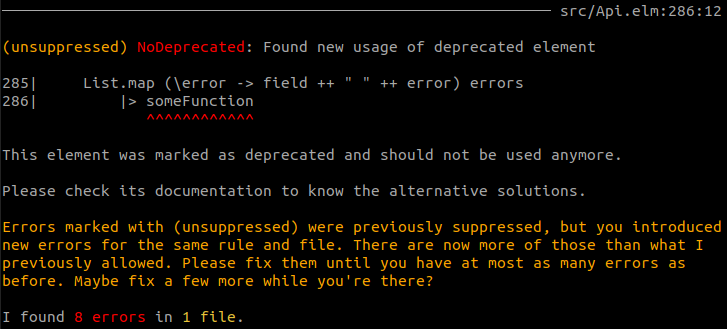
Fixing a suppressed error

To summarize...
False positives and
effective false positives
lead to losing trust
Remove false reports
by providing more information
Communication
-
What is the problem?
-
Why is it a problem?
-
How to solve the problem?
Avoid accidental configuration
as much as possible
Only enable rules
you agree with
Better alternatives than
disable comments and warnings
to ensure rules are enforced
Tools can only gain trust by
correctly and transparently
doing their tasks
over and over again
Please open issues
to improve your linter
Thank you!
Jeroen Engels
@jfmengels

Learn more:
Talk: Static analysis tools love pure FP
https://www.youtube.com/watch?v=_rzoyBq4hJ0Elm Radio podcast
Slides: https://slides.com/jfmengels/why-you-dont-trust-your-linter

Linter has a lot of rules
Takes time to configure
Use someone else's configuration
Rules you don't agree with
🤬
🫶
// linter-disable
// linter-disable
// linter-disable
How should I fix this issue?
Should I ignore this report?
🤬
🫶
// linter-disable
// linter-disable
// linter-disable
Ignoring per file
config : List Rule
config =
[ NoDeprecated.rule
|> Rule.ignoreErrorsForFiles
[ "src/Api.elm"
, -- ...and other files
]
]except here
New issues will be reported
Elm is knowable
No dynamic function calls
No side-effects
No mutations
No macros
...
No memory management
No race conditions
...
Elm is knowable
Better understanding of the code
(Almost) no false positives
Generated/vendored code
Simpler and knowable
languages make for
better analysis
Deceitful linters
False negatives
You don't trust your linter
firm belief in the reliability, truth, or ability of someone or something.
Trust
firm belief in the reliability, truth, or ability of someone or something.
Fix Don'ts
Never provide fixes that lead to compiler errors
Don't provide a fix if the user needs to do a follow up
Automatic fixes
🤬
code style
TODO Give example of code fix where style becomes not like what you wished
Automatic fixes
❤️
code formatters
Linting

Linting?
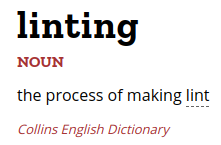
Unnecessary ESLint rules for Elm
92% (56/61) of the recommended rules
87% (228/263) of all the rules
People enable rules they don't agree with
It's hard to configure so many rules
Large use of premade configurations
Linters are about
enforcing code style
Code formatters
module MyModule exposing (Model, Msg, update, view)
import Html exposing (Html, button, div, text)
import Html.Events exposing (onClick)
type alias Model =
{ count : Int }
type Msg
= Increment
| Decrement
update : Msg -> Model -> Model
update msg model =
case msg of
Increment ->
{ model | count = model.count + 1 }
Decrement ->
{ model | count = model.count - 1 }
view : Model -> Html Msg
view model =
div []
[ button [ onClick Increment ] [ text "+1" ]
, div [] [ text <| String.fromInt model.count ]
, button [ onClick Decrement ] [ text "-1" ]
]Linters are
NOT about
formatting
Linters are
NOT
about code style
Writing a
Static Code Analysis Rule
Written in Elm, for Elm
-
Every Elm developer knows Elm
-
No runtime errors
Abstract Syntax Trees
(a + b) / 2Integer 2OperatorApplication
operator +FunctionOrValue aOperatorApplication
operator /FunctionOrValue bParenthesizedExpression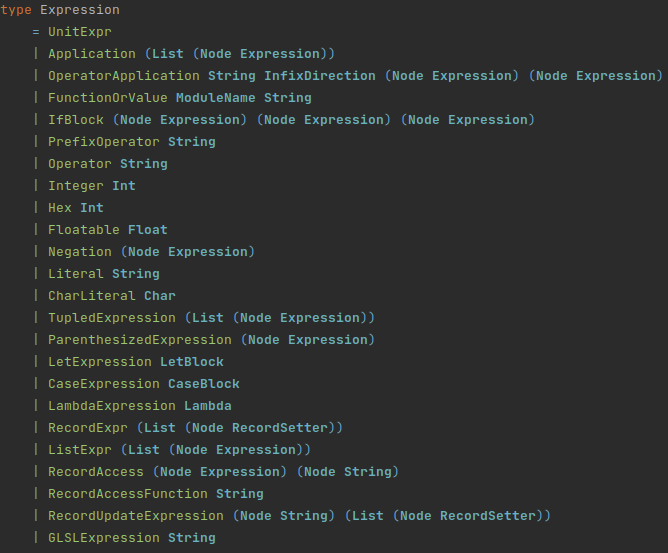
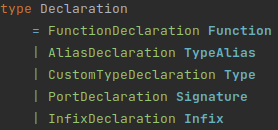
rule : Rule
rule =
Rule.newSchema "NoUsingHtmlButton" ()
|> Rule.withExpressionVisitor expressionVisitor
|> Rule.fromSchema
expressionVisitor : Node Expression -> Context -> ( List Error, Context )
expressionVisitor node context =
case Node.value node of
Expression.FunctionOrValue [ "Html" ] "button" ->
( [ -- Report an error
]
, context
)
_ ->
( [], context )expressionVisitor : Node Expression -> Context -> ( List Error, Context )
expressionVisitor node context =
case Node.value node of
Expression.FunctionOrValue [ "Html" ] "button" ->
( [ Rule.error
"Do not use Html.button"
(Node.range node)
]
, context
)
_ ->
( [], context )Creating guarantees
in a project
We have a great product,
it's working well and it never crashes.
But we have an inconsistent UI.
Let's improve that.
-- Page/Checkout.elm
viewConfirmButton : Html msg
viewConfirmButton =
Html.button
[ Attr.style "height" "35px"
, Events.onClick UserClickedOnConfirmButton
]
[ Html.text "Confirm" ]-- Page/Payment.elm
viewPayButton : Html msg
viewPayButton =
Html.button
[ Attr.style "height" "33px"
, Events.onClick UserClickedOnPayButton
]
[ Html.text "Pay" ]
module Ui.Button exposing (confirm, cancel, andSomeOtherButtons)
confirm : msg -> String -> Html msg
cancel : msg -> String -> Html msg-- Page/Checkout.elm
import Ui.Button as Button
viewConfirmButton : Html msg
viewConfirmButton =
Button.confirm UserClickedOnConfirmButton "Confirm"-- Page/Payment.elm
import Ui.Button as Button
viewPayButton : Html msg
viewPayButton =
Button.confirm UserClickedOnPayButton "Pay""We now have great modules for every UI element.
Now we are sure to have a consistent UI across the application."
New pull request comes in...
view : Model -> Html Msg
view model =
Html.button
[ Attr.style "height" "34px"
, Events.onClick UserClickedOnRemoveButton
]
[ Html.text "Remove" ]Providing information
-
Type information
-
Dependencies
-
Project manifest, README
-
Collecting data while traversing
False positive in
Ui.Button
type alias Context =
{ isUiButtonModule : Bool }
rule : Rule
rule =
Rule.newSchema "NoUnusedDeclarations" { isUiButtonModule = False }
-- visitors...
|> Rule.withModuleDefinitionVisitor moduleDefinitionVisitor
|> Rule.fromSchema
moduleDefinitionVisitor : Node Module -> Context -> ( List Error, Context )
moduleDefinitionVisitor (Node _ { moduleName }) context =
( [], { isUiButtonModule = (moduleName == "Ui.Button") } )module Ui.Button exposing (confirm, cancel, andSomeOtherButtons)expressionVisitor : Node Expression -> Context -> ( List Error, Context )
expressionVisitor node context =
case Node.value node of
Expression.FunctionOrValue [ "Html" ] "button" ->
if not context.isUiButtonModule then
( [ Rule.error {- ... -} ]
, context
)
else
( [], context )
_ ->
( [], context )Gathering context from multiple files
module A exposing (used, neverUsed)
used =
"some thing"
neverUsed =
"other thing"module B exposing (thing)
import A
thing =
A.used ++ " is exposed"Report unused exports
elm-review
Creating guarantees
Communication
Reducing false positives
Ignoring reports
Trustworthy automatic fixes
Developers need to trust their tools
How do we prevent this from happening?
Types...? Tests...?
view : Model -> Html Msg
view model =
Html.button
[ Attr.style "height" "34px"
, Events.onClick UserClickedOnRemoveButton
]
[ Html.text "Remove" ]If you can detect the problem just by reading the code, static code analysis can help.
We need a linter
with custom rules
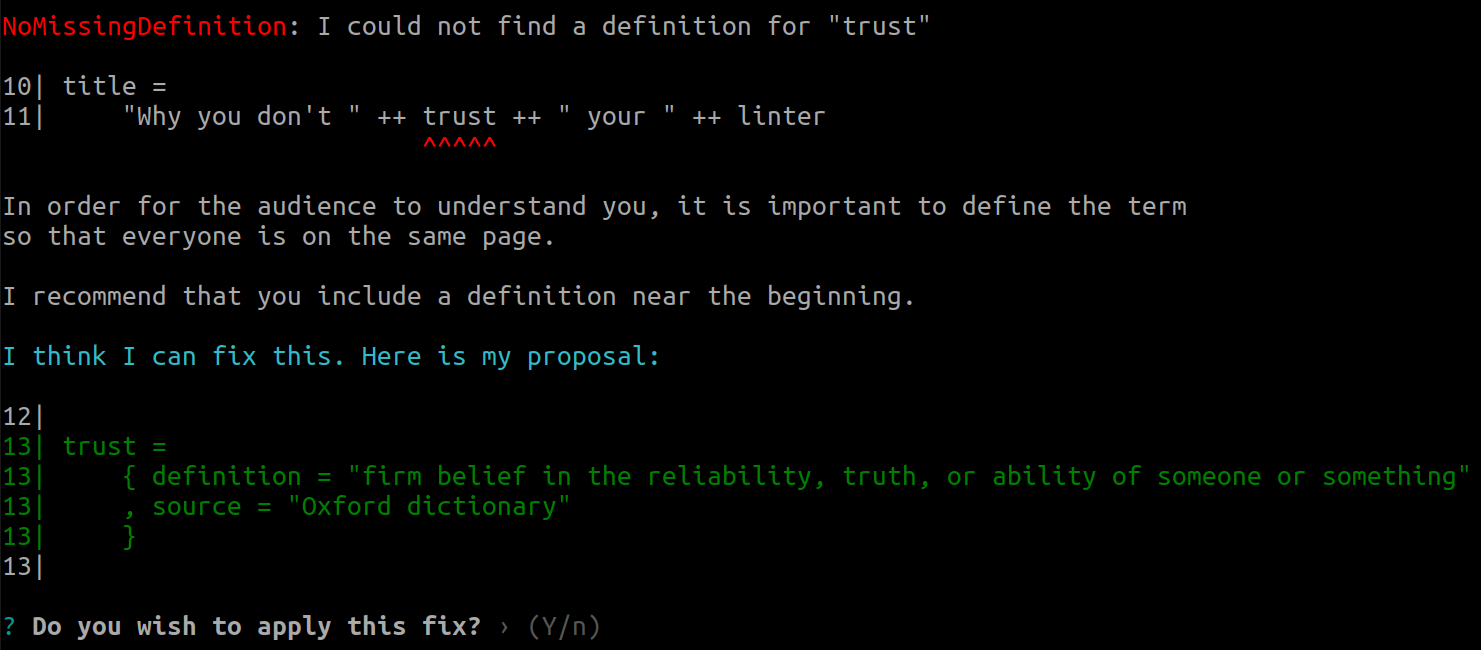
Are we getting the
message across?

File path
Rule name
Location
Message
Are we getting the
message across?
File path
Rule name
Location
Message

Good rule documentation
What is the target problem?
What are the consequences of the problem?
When should you (not) enable the rule?
(types and tests) Writing linter rules
By Jeroen Engels
(types and tests) Writing linter rules
Talk for nordevcon 2023
- 487


